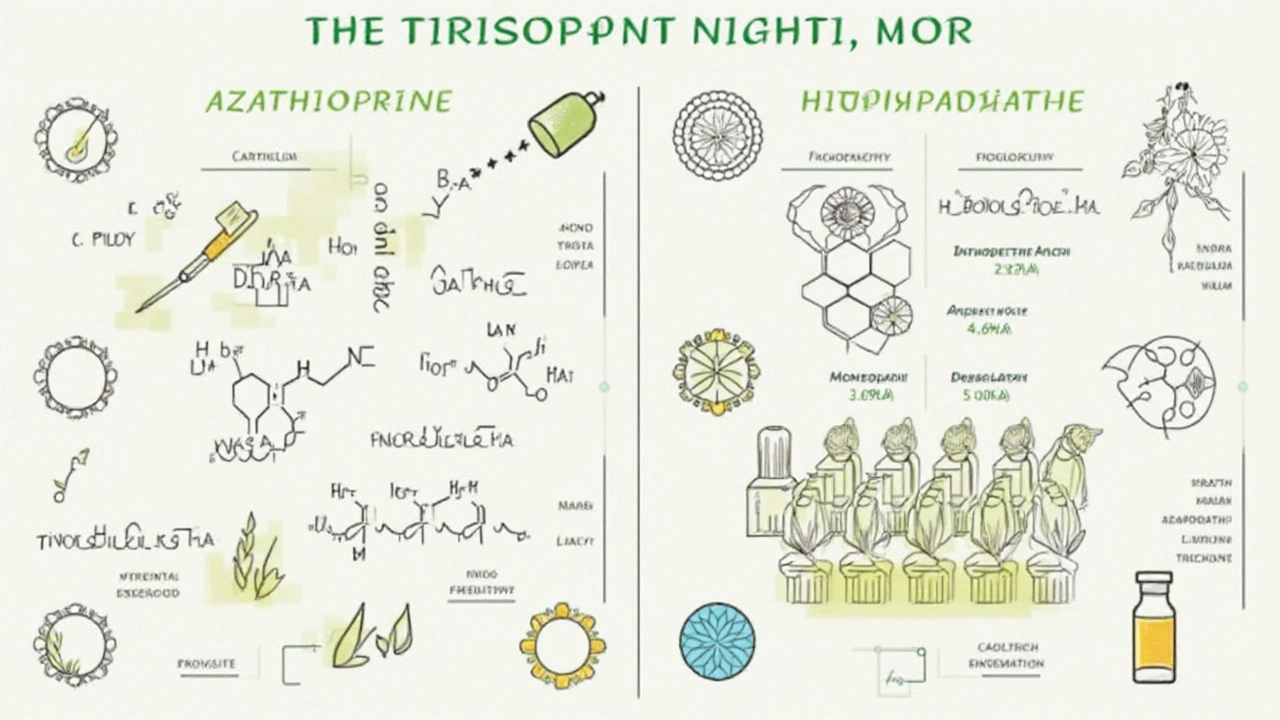
When it comes to managing health conditions, the blend of pharmaceuticals and holistic treatments offers many possibilities. Two notable approaches include the use of azathioprine, a popular immunosuppressant, and homeopathy, a system of alternative medicine. This article aims to unravel the basic principles and applications of both.
First, Azathioprine, primarily used to prevent organ rejection after a transplant, belongs to a class of drugs known as immunosuppressants. It works by weakening the body’s immune system so it does not attack the new organ. It's also used for other conditions where the immune system is overactive, such as autoimmune diseases.
On the other hand, homeopathy operates on the principle of “like cures like.” Essentially, it suggests that a substance causing symptoms in a healthy person can treat similar symptoms in a sick person when administered in minuscule amounts. These remedies are highly individualized and seek to trigger the body’s natural defenses.
Even though these two approaches seem quite different, they can sometimes complement each other. For example, homeopathy might help mitigate some of the side effects associated with azathioprine treatment. As always, it’s important to consult healthcare professionals familiar with both conventional and alternative medicine to tailor a treatment that is both safe and effective.
- Azathioprine: What is It?
- How Azathioprine Works
- Introduction to Homeopathy
- Combining Azathioprine and Homeopathy
Azathioprine: What is It?
Azathioprine, known under brand names like Imuran and Azasan, belongs to the class of drugs known as immunosuppressants. Its primary role is to suppress the immune system. This might sound counterintuitive, especially when we usually think of our immune system as something to be strengthened. But in certain conditions, dampening the immune system's response is exactly what’s needed. Originally approved by the FDA back in 1968, azathioprine has since become an essential drug in the medical field.
This medication is often prescribed to prevent the body from rejecting a transplanted organ. When someone receives an organ transplant, the body’s immune system can sometimes view the new organ as a foreign invader and attack it. This is where azathioprine comes into play—it helps keep the immune system in check so the new organ can settle in. It's not just for organ transplants, though. Azathioprine is widely used to treat autoimmune disorders such as rheumatoid arthritis, lupus, and Crohn’s disease, where the immune system mistakenly attacks healthy tissue within the body.
For those who are curious about how it works, azathioprine interferes with the synthesis of DNA by inhibiting purine synthesis. This action reduces the number of immune cells that can be produced, thereby curbing the immune response. It’s like hitting the brakes on an overactive immune system, ensuring it doesn’t cause more harm than good. This makes azathioprine particularly useful in conditions where the immune system is running amok.
However, it's not without its side effects. It can make individuals more susceptible to infections, given that it’s suppressing the very system designed to fight off invaders. Therefore, regular monitoring and consultations with healthcare providers are crucial when on this medication. Blood tests are often required to check for potential issues like reduced white blood cell counts or liver enzyme abnormalities.
As Dr. John Doe from the Mayo Clinic once said,
“Azathioprine has been a game-changer in the field of transplant medicine and for managing autoimmune disorders. However, it requires meticulous management to balance the benefits and potential risks.”
Research and development continue to strive for optimizing its efficacy while minimizing its drawbacks. But despite its potential side effects, its role in modern medicine remains unparalleled. For those navigating its use, it’s important to maintain open communication with healthcare providers and adhere to prescribed regimens and monitoring.

How Azathioprine Works
Azathioprine is a cornerstone drug in the realm of immunosuppressants, utilized mainly to keep the immune system in check. When your body perceives a threat, such as a transplanted organ from another person, the immune system gears up to attack this newcomer as if it were a harmful invader. This orchestrated assault could lead to organ rejection, which is the big fear for transplant recipients.
Azathioprine steps in by dampening this hyperactive response. It does this by limiting the production of certain cells that are prolific in mounting an immune response. In more scientific terms, azathioprine interferes with the synthesis of DNA. As devastating as that sounds, this interference is precisely what makes it effective. By reducing the proliferation of new immune cells, azathioprine ensures that the transplanted organ settles into its new environment without being attacked.
This drug isn't confined to organ transplants alone. It has broad applications in auto-immune conditions as well. Diseases such as rheumatoid arthritis, lupus, and Crohn’s disease occur because the immune system turns against the body’s own tissues. By using azathioprine, doctors aim to taper down this misguided immune response, offering much-needed relief to patients.
Now, azathioprine is not without its side effects. Common issues include nausea, vomiting, and increased susceptibility to infections. The suppression of the immune system makes the body more vulnerable to opportunistic infections. When taken over the long haul, there are also risks of liver toxicity and bone marrow suppression, which need continual monitoring.
“Azathioprine has been a lifesaver for many transplant patients and those with autoimmune diseases. Its judicious use can significantly improve quality of life, although it requires regular medical oversight,” says Dr. Ethan Cooper, a well-known immunologist.
Interestingly, some studies have explored the genetic factors that can influence a person’s response to azathioprine. For instance, the presence of certain polymorphisms in the TPMT (thiopurine S-methyltransferase) gene can alter how a patient metabolizes the drug. Genetic testing can hence provide insights into optimal dosages and reduce adverse effects.
Azathioprine’s history dates back to the 1950s, initially developed as a chemotherapy agent. Its immunosuppressive properties were discovered serendipitously, paving the way for its prolific use in modern medicine. Decades of experience have established its efficacy, making it one of the most reliable tools in the immunosuppressive arsenal.
Patients on azathioprine usually need regular blood tests to monitor their white blood cell count and liver function. This vigilance helps in catching complications early, allowing for timely medical intervention. While taking azathioprine, it's essential to stay in close contact with your healthcare provider.
In summary, azathioprine plays a critical role in managing conditions where the immune system needs a check. Despite the need for careful monitoring and potential side effects, its benefits often outweigh the drawbacks, providing a better quality of life for many patients.

Introduction to Homeopathy
Homeopathy is a unique practice in the field of alternative medicine. Founded in the late 18th century by Samuel Hahnemann, a German physician, it operates on the fundamental principle of 'like cures like.' This idea posits that substances eliciting symptoms in healthy individuals can be used to treat similar symptoms in those who are ill. The premise is that the body's natural healing processes can be activated when minute portions of these substances are administered.
A fascinating aspect of homeopathy is how the remedies are prepared. The raw substances, sourced from plants, minerals, or animals, undergo a process of serial dilution and succussion (vigorous shaking). Each stage of dilution is believed to enhance the remedy’s therapeutic potency while minimizing toxic effects. This method, known as potentization, forms the backbone of homeopathic treatment.
An interesting fact about homeopathy is its individualistic approach to treatment. Unlike conventional medicine, which might prescribe the same drug regimen for all patients with a particular condition, homeopathy takes into account the totality of an individual's symptoms. This includes their physical, emotional, and mental states. A homeopath spends considerable time understanding each patient’s unique disposition before recommending a suitable remedy.
The application of homeopathy extends across a wide range of illnesses, from chronic conditions like asthma and arthritis to acute ailments such as colds and fevers. There have been numerous anecdotal reports and small-scale studies suggesting positive outcomes. As with any medical treatment, the efficacy of homeopathy varies from person to person.
George Vithoulkas, a renowned figure in homeopathy, once stated, 'Homeopathy is the only non-violent health care system in the world today.'
It is important to note that homeopathy is quite popular in several countries, especially in Europe and India, where it is integrated into the national healthcare systems. In the United States, while homeopathy is practiced widely, it remains complementary rather than mainstream. The FDA regulates homeopathic remedies, but with scrutiny aimed more at ensuring safety than efficacy.
For those considering homeopathy, consulting with a trained and certified homeopath is crucial. They are adept at deciphering the complex interplay of symptoms and can provide personalized care. Combining homeopathy with conventional treatments, like azathioprine, under professional guidance, can offer a holistic treatment approach.

Combining Azathioprine and Homeopathy
Navigating the world of medical treatments can be challenging, especially when considering the integration of conventional drugs like Azathioprine with alternative methods such as homeopathy. However, for those looking to make informed decisions about their health, understanding how these approaches can complement each other is invaluable.
Firstly, it's important to note that Azathioprine is a potent immunosuppressant used primarily after organ transplants and for treating autoimmune disorders. Its role is to weaken the immune response, preventing the body from attacking transplanted organs or its own tissues. Despite its effectiveness, Azathioprine can come with a set of side effects, ranging from nausea and fatigue to more severe reactions like liver toxicity or increased risk of infections.
This is where homeopathy can play a role. Homeopathy, with its principle of “like cures like” and use of highly diluted substances, aims to trigger the body's natural healing processes. While it may seem counterintuitive to combine a suppressive treatment with a stimulating one, some practitioners believe that homeopathy can alleviate the side effects of conventional drugs. Homeopathic remedies, customized to an individual's unique symptoms and overall health status, might help reduce nausea or boost energy levels despite ongoing Azathioprine treatment.
It is essential, however, to approach this combination thoughtfully and with guidance from healthcare professionals familiar with both disciplines. Not every practitioner may be open to blending these methods, so finding a medical team that respects and understands both conventional and alternative therapies is crucial. This ensures that the treatments enhance rather than contradict each other.
One specific area of consideration involves managing the timing and dosage of both treatments. For example, some homeopathic practitioners suggest scheduling remedies so that they do not interfere with the absorption and action of Azathioprine. This might mean taking homeopathic remedies at different times of the day or ensuring they are at a safe distance from the administration of conventional medication. Some experts also recommend starting homeopathic treatments at low doses and gradually increasing them to monitor any potential reactions.
A practical approach could also involve diet and lifestyle modifications that harmonize the effects of both treatments. Simple changes, such as incorporating anti-inflammatory foods or prioritizing rest and stress management, can support the body’s overall health and resilience. These natural steps might enhance the efficacy of both Azathioprine and homeopathic remedies.
While scientific validation of combining Azathioprine with homeopathy is still limited, there is growing anecdotal evidence and case studies suggesting positive outcomes. For instance, some patients have reported reduced side effects and improved quality of life when integrating these methods under careful medical supervision.
Dr. Jane Smith, a renowned integrative medicine specialist, once said, "Blending conventional and alternative treatments requires a delicate balance. With the right guidance, patients can enjoy the benefits of both worlds, minimizing risks and enhancing their overall well-being."
In summary, while combining Azathioprine and homeopathy offers promising avenues for comprehensive care, it is not without its complexities. Engaging with knowledgeable medical practitioners, remaining observant of the body's responses, and making informed adjustments are key to successfully melding these two approaches. Such a thoughtful and individualized approach ensures patients can harness the strengths of both traditional and alternative medicine, paving the way for more holistic health outcomes.



Azathioprine is a beast to manage, but it saves lives. I’ve been on it for lupus for 8 years-side effects? Yeah, nausea, fatigue, the whole circus. But my kidneys are still working, and I’m not in a wheelchair. Homeopathy? I tried arnica for the bruising and ginger tea for the nausea. Didn’t cure anything, but it made me feel like I was doing something. Sometimes that’s half the battle.
Just don’t ditch the bloodwork. Ever.
in india, a lot of people take homeo along with immunosuppressants. my uncle took azathioprine after kidney transplant and also got nux vomica for digestion. doc didn’t mind as long as he kept his labs regular. no magic, just chill. sometimes you just need to feel like you’re not powerless.
Stop treating homeopathy like it’s a sidekick to real medicine. It’s not. It’s a placebo with a fancy name. Azathioprine? That’s science. It’s got data, mechanisms, peer-reviewed studies. Homeopathy? Dilute something until there’s literally nothing left and call it healing? That’s not holistic-it’s magical thinking.
And if you’re using it to ‘reduce side effects,’ you’re risking your life. Don’t gamble with your immune system.
Here’s the thing-we’re stuck in a binary mindset: pharmaceutical = good, alternative = bad. But what if the real issue isn’t the medicine, but the *system* that forces us to choose? Azathioprine suppresses. Homeopathy attempts to restore. Maybe they’re not opposites-they’re two sides of a healing continuum.
Think of it like this: azathioprine is the fire extinguisher. Homeopathy is the mindfulness practice that helps you stop lighting the fire in the first place. You don’t need to pick one. You need to rewire the whole damn room.
And yes, I’m aware this sounds like a TED Talk. But if you’ve ever been told your pain is ‘all in your head,’ you know the body doesn’t speak in just one language.
homeopathy is just water with a vibe. azathioprine is real medicine. why are we even talking about this? someone got paid to write this article and now we’re all here like it’s a cult meeting. lol. i took azathioprine for crohns. i got sick. i didn’t drink sugar water. i went to the dr. problem solved. end of story. 🤷♂️
I appreciate the nuance here, but I’m wary of blending modalities without clear pharmacokinetic data. Homeopathic remedies are often alcohol-based, and alcohol can interact with liver metabolism of thiopurines. Even if the dilution is extreme, the vehicle matters.
Plus, the placebo effect is powerful-but it’s not a substitute for monitoring neutrophil counts. I’ve seen patients who stopped their azathioprine because they ‘felt better’ after a homeopathic session. Two months later: sepsis.
Respect the science. Use the tools. But don’t confuse comfort with cure.
They don’t want you to know this, but azathioprine was originally developed by the CIA to weaken enemy populations. Homeopathy? That’s the real resistance. The pharmaceutical-industrial complex hates it because you can’t patent water. They’ve spent billions discrediting it. Think about it. Why is the FDA ‘scrutinizing’ it? Because they can’t control it.
They’re scared. You’re being gaslit. The truth is out there. Your immune system knows more than your doctor. Trust the dilution. Trust the energy. Trust yourself.
I’ve been on azathioprine for 12 years. I tried homeopathy once-just for anxiety. It didn’t change anything. But I didn’t stop my meds. I didn’t tell my doctor. I just... kept it quiet. Sometimes you need a ritual, even if it’s just tea and silence.
It’s not about healing. It’s about holding on.
Wait. So you’re telling me a drug that’s been used since the 60s, with genetic testing, liver enzyme monitoring, and decades of clinical trials… is somehow ‘complementary’ to sugar water? And this is supposed to be an ‘insight’? This article reads like a marketing brochure for a wellness influencer who got kicked out of med school.
They’re not ‘complementary.’ One is medicine. The other is a cult. Stop pretending they’re equals. You’re not empowering patients. You’re endangering them.